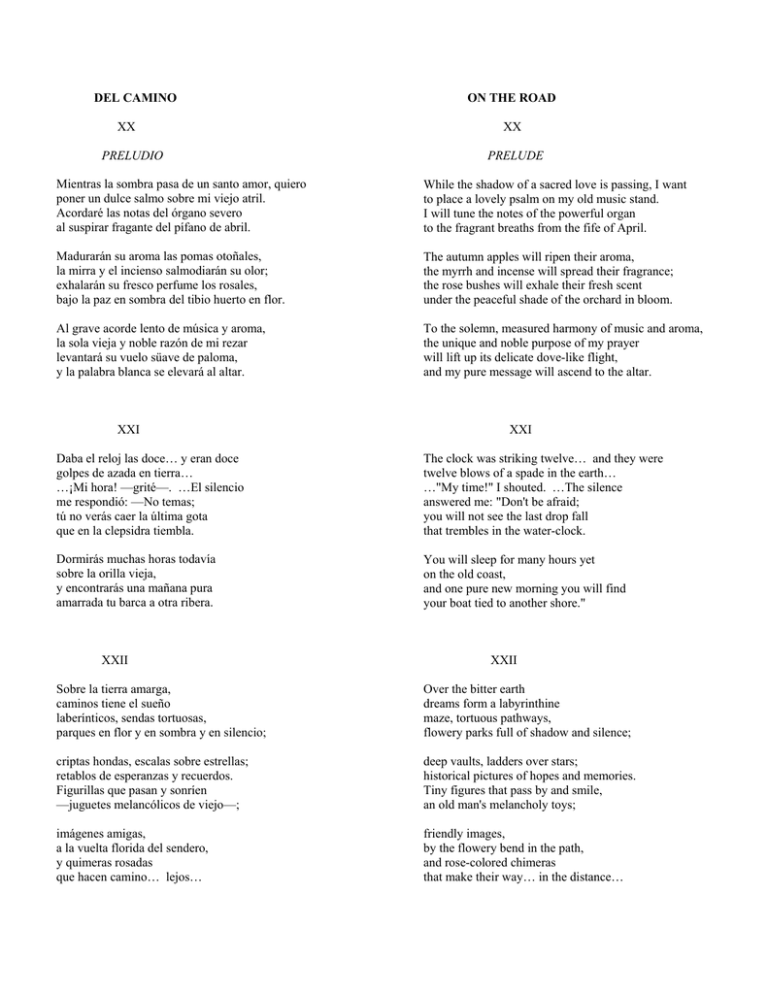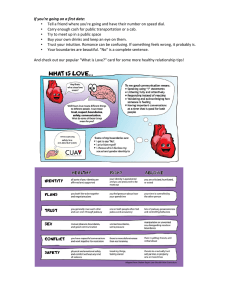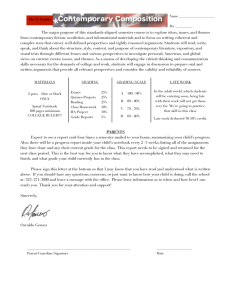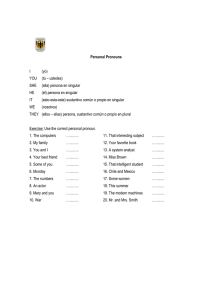solitude / soledades
Anuncio

DEL CAMINO XX PRELUDIO ON THE ROAD XX PRELUDE Mientras la sombra pasa de un santo amor, quiero poner un dulce salmo sobre mi viejo atril. Acordaré las notas del órgano severo al suspirar fragante del pífano de abril. While the shadow of a sacred love is passing, I want to place a lovely psalm on my old music stand. I will tune the notes of the powerful organ to the fragrant breaths from the fife of April. Madurarán su aroma las pomas otoñales, la mirra y el incienso salmodiarán su olor; exhalarán su fresco perfume los rosales, bajo la paz en sombra del tibio huerto en flor. The autumn apples will ripen their aroma, the myrrh and incense will spread their fragrance; the rose bushes will exhale their fresh scent under the peaceful shade of the orchard in bloom. Al grave acorde lento de música y aroma, la sola vieja y noble razón de mi rezar levantará su vuelo süave de paloma, y la palabra blanca se elevará al altar. To the solemn, measured harmony of music and aroma, the unique and noble purpose of my prayer will lift up its delicate dove-like flight, and my pure message will ascend to the altar. XXI XXI Daba el reloj las doce… y eran doce golpes de azada en tierra… …¡Mi hora! —grité—. …El silencio me respondió: —No temas; tú no verás caer la última gota que en la clepsidra tiembla. The clock was striking twelve… and they were twelve blows of a spade in the earth… …"My time!" I shouted. …The silence answered me: "Don't be afraid; you will not see the last drop fall that trembles in the water-clock. Dormirás muchas horas todavía sobre la orilla vieja, y encontrarás una mañana pura amarrada tu barca a otra ribera. You will sleep for many hours yet on the old coast, and one pure new morning you will find your boat tied to another shore." XXII XXII Sobre la tierra amarga, caminos tiene el sueño laberínticos, sendas tortuosas, parques en flor y en sombra y en silencio; Over the bitter earth dreams form a labyrinthine maze, tortuous pathways, flowery parks full of shadow and silence; criptas hondas, escalas sobre estrellas; retablos de esperanzas y recuerdos. Figurillas que pasan y sonríen —juguetes melancólicos de viejo—; deep vaults, ladders over stars; historical pictures of hopes and memories. Tiny figures that pass by and smile, an old man's melancholy toys; imágenes amigas, a la vuelta florida del sendero, y quimeras rosadas que hacen camino… lejos… friendly images, by the flowery bend in the path, and rose-colored chimeras that make their way… in the distance… XXIII XXIII En la desnuda tierra del campo la hora florida brota, espino solitario, del valle humilde en la revuelta umbrosa. In the stark landscape of my path the beautiful hour blossoms, a solitary hawthorn tree in the shady hollow of the humble valley. El salmo verdadero de tenue voz hoy torna al corazón, y al labio la palabra quebrada y temblorosa. The delicate voice of the true psalm today returns to my heart, and the fragile and trembling word to my lips. Mis viejos mares duermen; se apagaron sus espumas sonoras sobre la playa estéril. La tormenta camina lejos en la nube torva. My old seas are dormant; the sonorous foam has subsided on the sterile beach. The storm moves far away in the dark cloud. Vuelve la paz al cielo; la brisa tutelar esparce aromas otra vez sobre el campo, y aparece en la bendita soledad, tu sombra. The sky is peaceful once more; the warm breeze scatters aromas again over the earth, and there, in the blessed solitude, your shadow. XXIV XXIV El sol es un globo de fuego, la luna es un disco morado. The sun is a globe of fire, the moon is a mauve disc. Una blanca paloma se posa en el alto ciprés centenario. A white dove perches on the tall hundred-year-old cypress. Los cuadros de mirtos parecen de marchito velludo empolvado. The squares of myrtles seem like dusty faded velvet. ¡El jardín y la tarde tranquila!... Suena el agua en la fuente de mármol. The garden and the quiet afternoon!... The water bubbles in the marble fountain. XXV XXV ¡Tenue rumor de túnicas que pasan sobre la infértil tierra!... ¡Y lágrimas sonoras de las campanas viejas! The subtle noise of tunics that pass over the infertile land!… And the sonorous tears of the ancient bells! Las ascuas mortecinas del horizonte humean… Blancos fantasmas lares van encendiendo estrellas. The dying embers are smoking on the horizon… Ghostly white Lares are lighting the stars, —Abre el balcon. La hora de una ilusión se acerca… Open the balcony. The hour of an illusion approaches… La tarde se ha dormido, y las campanas sueñan. The afternoon has gone to sleep and the bells are dreaming. XXVI XXVI ¡Oh figuras del atrio, más humildes cada día y lejanas: mendigos harapientos sobre marmóreas gradas; Oh figures in the churchyard, every day more humble and remote: ragged beggars on the marble steps; miserables ungidos de eternidades santas, manos que surgen de los mantos viejos y de las rotas capas! unfortunates anointed with sacred eternities, hands extended from their old cloaks and from their torn capes! ¿Pasó por vuestro lado una ilusión velada, de la mañana luminosa y fría en las horas más plácidas?... Did an obscure vision of the bright and cold morning come to you during the most peaceful hours?... Sobre la negra túnica, su mano era una rosa blanca… Against the black tunic, his hand was a white rose… XXVII XXVII La tarde todavía dará incienso de oro a tu plegaria, y quizás el cenit de un nuevo día amenguará tu sombra solitaria. The afternoon will still give a golden aroma to your prayer, and perhaps the zenith of a new day will diminish your solitary shadow. Mas no es tu fiesta el Ultramar lejano, sino la ermita junto al manso río, no tu sandalia el soñoliento llano pisará, ni la arena del hastío. Your goal is not a distant country, but a humble refuge near the gentle river; your sandal will not tread the sleepy plains nor the dry sands of boredom. Muy cerca está, romero, la tierra verde y santa y florecida de tus sueños; muy cerca, peregrino que desdeñas la sombra del sendero y el agua del mesón en tu camino. Very close by, wanderer, is the green and fertile holy land of your dreams; very nearby, pilgrim who scorns the shady path and the water of the inn on your way. XXVIII XXVIII Crear fiestas de amores en nuestro amor pensamos, quemar nuevos aromas en montes no pisados, We thought that we could make our love a grand festival, kindle new aromas on unknown mountains, y guardar el secreto de nuestros rostros pálidos, porque en las bacanales de la vida vacías nuestras copas conservamos, mientras con eco de cristal y espuma ríen los zumos de la vid dorados. and hide the secret of our pallid faces, because in the Bacchanalia of life our cups are always empty while the golden juices of the vine laugh with a crystalline and foamy echo. Un pájaro escondido entre las ramas del parque solitario, silba burlón… Nosotros exprimimos la penumbra de un sueño en nuestro vaso… A bird hidden among the branches of the lonely park whistles mockingly… We squeeze the shadow of a dream into our glass… Y algo que es tierra en nuestra carne, siente la humedad del jardín como un halago. And something that is earth in our flesh feels the moisture of the garden like a caress. XXIX XXIX Arde en tus ojos un misterio, virgen esquiva y compañera. A mystery burns in your eyes, my shy virgin companion. No sé si es odio o es amor la lumbre inagotable de tu aljaba negra. I do not know if it is hate or love that feeds the inexhaustible flame of your black quiver. Conmigo irás mientras proyecte sombra mi cuerpo y quede a mi sandalia arena. You will be with me as long as my body casts its shadow and my sandal walks on the sand. —¿Eres la sed o el agua en mi camino? Dime, virgen esquiva y compañera. Are you the thirst, or the water on my journey? Tell me, my shy virgin companion. XXX XXX Algunos lienzos del recuerdo tienen luz de jardín y soledad de campo; la placidez del sueño en el paisaje familiar soñado. Some canvases of memory have the brightness of a lonely country garden, the peacefulness of a dream in the familiar landscape of sleep. Otros guardan las fiestas de días aún lejanos; figurillas sutiles que pone un titerero en su retablo… ....... Others show the celebration of more distant days, miniature figures which the puppeteer moves in his show… ........ Ante el balcón florido, está la cita de un amor amargo. Outside the flowery balcony is the rendezvous with a bitter love. Brilla la tarde en el resol bermejo… La hiedra efunde de los muros blancos… The afternoon sparkles in the reddish sunshine… The ivy spills down the white walls… A la revuelta de una calle en sombra, un fantasma irrisorio besa un nardo. In the bend of a shadowy street an illusory phantom kisses a white lily. XXXI XXXI Crece en la plaza en sombra el musgo, y en la piedra vieja y santa de la iglesia. En el atrio hay un mendigo… Más vieja que la iglesia tiene el alma. The moss grows in the shadowy plaza, and on the hallowed old stone of the church. In the portico is a beggar… His soul is even older than the church. Sube muy lento, en las mañanas frías, por la marmórea grada, hasta un rincón de piedra… Allí aparece su mano seca entre la rota capa. On the cold mornings he slowly climbs the marble steps toward a stone recess… There his withered hand emerges from his tattered cape. Con las órbitas huecas de sus ojos ha visto cómo pasan las blancas sombras, en los claros días, las blancas sombras de las horas santas. Through the hollow sockets of his eyes he has seen the passing of the white shadows on the clear days, the white shadows of the sacred hours. XXXII Las ascuas de un crepúsculo morado detrás del negro cipresal humean… En la glorieta en sombra está la fuente con su alado y desnudo Amor de piedra que sueña mudo. En la marmórea taza reposa el agua muerta. XXXII The embers of a reddish sunset are smoking behind the black cypresses… In a shadowy alcove is the fountain with the winged figure of a naked stone cupid silently dreaming. In the marble basin the dead water is standing. XXXIII XXXIII ¿Mi amor?... ¿Recuerdas, dime, aquellos juncos tiernos, lánguidos y amarillos que hay en el cauce seco?... My love? Tell me, do you remember those tender rushes, languid and yellow, that grow in the dry riverbed?... ¿Recuerdas la amapola que calcinó el verano, la amapola marchita, negro crespón del campo?... Do you remember the poppy dried out by the summer, the withered poppy, like black crepe on the field?... ¿Te acuerdas del sol yerto y humilde, en la mañana, que brilla y tiembla roto sobre una fuente helada?... Do you remember the motionless and dim sunlight in the morning that shines and trembles falling on a frozen fountain?... XXXIV XXXIV Me dijo un alba de la primavera: Yo florecí en tu corazón sombrío ha muchos años, caminante viejo que no cortas las flores del camino. The dawn of a spring morning told me: I flourished in your somber heart many years ago, ancient traveler who does not smell the flowers by the roadside. Tu corazón de sombra ¿acaso guarda el viejo aroma de mis viejos lirios? ¿Perfuman aún mis rosas la alba frente del hada de tu sueño adamantino? Your somber heart, does it still contain the old aroma of my old lilies? Do my roses still perfume the ivory brow on the fairy of your diamantine dream? Respondí a la mañana: Sólo tienen cristal los sueños míos. Yo no conozco el hada de mis sueños; ni sé si está mi corazón florido. I answered the morning: Only my dreams are of crystal. I do not know the fairy of my dreams, or if my heart is filled with flowers. Pero si aguardas la mañana pura que ha de romper el vaso cristalino, quizás el hada te dará tus rosas, mi corazón tus lirios. But if you wait for the pure morning that must break this crystal vessel, perhaps the fairy will give you your roses, and my heart, your lilies. XXXV Al borde del sendero un día nos sentamos. Ya nuestra vida es tiempo, y nuestra sola cuita son las desesperantes posturas que tomamos para aguardar… Mas Ella no faltará a la cita. XXXV One day we sat down by the side of the road. We now live in the present, and we only care about the desperate poses we assume in order to wait… But She will not be late for our date. XXXVI Es una forma juvenil que un día a nuestra casa llega. Nosotros le decimos: ¿por qué tornas a la morada vieja? Ella abre la ventana, y todo el campo en luz y aroma entra. En el blanco sendero, los troncos de los árboles negrean; las hojas de sus copas son humo verde que a lo lejos sueña. Parece una laguna el ancho río entre la blanca niebla de la mañana. Por los montes cárdenos camina otra quimera. XXXVI Here is a young form that one day arrives at our house. We ask: "Why have you come back to your old dwelling? She opens the window, and all the light and aroma enter. On the white path the tree-trunks look black; the leaves on the treetops are green smoke that dreams in the distance. The broad river seems like a pond in the white mist of the morning. Through the purple mountains another chimera is traveling. XXXVII XXXVII Oh dime, noche amiga, amada vieja, que me traes el retablo de mis sueños siempre desierto y desolado, y sólo con mi fantasma dentro, mi pobre sombra triste sobre la estepa y bajo el sol de fuego, o soñando amarguras en las voces de todos los misterios, dime, si sabes, vieja amada, dime si son mias las lágrimas que vierto. Me respondió la noche: Jamás me revelaste tu secreto. Yo nunca supe, amado, si eres tú ese fantasma de tu sueño ni averigüé si era su voz la tuya o era la voz de un histrión grotesco. Tell me, friendly night, my old beloved who brings me the puppet-world of dreams that is always empty and desolate, with only my phantom inside it, my poor unhappy shadow on the barren plains under a sun of fire, or dreaming of the bitterness in all the mysterious voices, tell me if you can, my old beloved, tell me: are these my tears that I am shedding? The night answered me: You never told me your secret. Beloved, I never knew if you were that phantom in your dream, nor did I determine if the voice was yours or the voice of some grotesque actor. Dije a la noche: Amada mentirosa, tú sabes mi secreto; tú has visto la honda gruta donde fabrica su cristal mi sueño, y sabes que mis lágrimas son mías, y sabes mi dolor, mi dolor viejo. I said to the night: Deceitful beloved, you do know my secret; you have seen the deep cavern where the crystal of my dream is made, you know that these tears are mine, and you know my pain, my old pain. ¡Oh! Yo no sé, dijo la noche, amado, yo no sé tu secreto, aunque he visto vagar ese, que dices desolado fantasma, por tu sueño. Oh, beloved, said the night, I do not know; I do not know your secret, although I have seen the unhappy phantom you describe as it wanders through your dream. Yo me asomo a las almas cuando lloran y escucho su hondo rezo, humilde y solitario, ese que llamas salmo verdadero; pero en las hondas bóvedas del alma no sé si el llanto es una voz o un eco. I look into the souls when they weep and I listen to their solemn prayer, humble and solitary, the one you call the true psalm; but in the deep recesses of the soul I cannot tell if the weeping is a voice, or an echo. Para escuchar tu queja de tus labios yo te busqué en tu sueño, y allí te vi vagando en un borroso laberinto de espejos. To hear the lament from your lips I sought you in your dream, and I saw you wandering there in a hazy labyrinth of mirrors.



